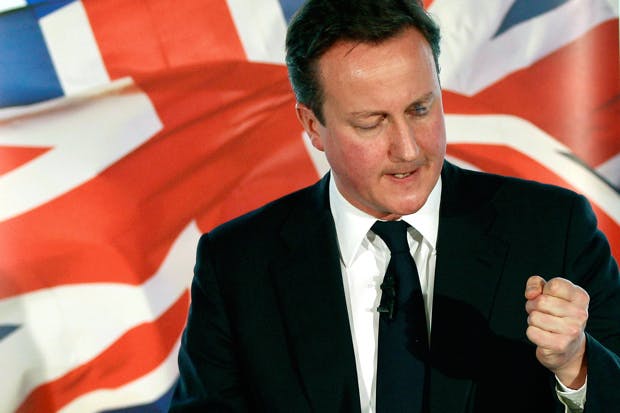Listen
When election day dawns, it’s worth bearing in mind that two million more people will be going to work than when David Cameron came to power. On an average day in Britain, there are 1,500 fewer reported crimes than there were before Theresa May was made Home Secretary. Some 2.2 million pupils now attend independent schools within the state system — schools given freedom through Michael Gove’s reforms. There is nothing theoretical about the advantages of Conservatism: they can be seen in classrooms, workplaces and streets all over Britain. But all this progress could be brought to a halt within the next week.
If Ed Miliband is elected, it will not be the richest who suffer most. They may pay more in tax — but, on the whole, they can afford to. Those who can afford to educate their children privately can afford to be more relaxed about a fresh decline in state education under Labour.
Anyone who already lives in an affluent, safe neighbourhood and has a steady job can afford the luxury of a protest vote: Ukip, perhaps, or the Liberal Democrats. David Cameron has caused many of his former supporters to despair, and they may want to punish him.
Those who would lose out under Labour are those who cannot afford a back-up plan. People desperately looking for a job will find fewer available once employers are under attack from a Miliband government that sees them as ‘predators’. Those already struggling to find a place to live will discover that availability shrinks once Labour’s rent controls are imposed. The elderly may have to pay higher fuel bills as companies prepare for Miliband’s two-year price freeze. The brunt of the Labour leader’s ideology will be borne by those who can least afford it.
Now, more than ever, a child’s life chances are dictated by quality of education — which is why Miliband’s hostility towards school reform is perhaps the most regressive of all his positions. Population growth means even he cannot halt school expansion, but he wants at least to remove choice by ensuring that no new schools are allowed to open where there are places to fill in a bad schools. So again, those who can afford to live in leafy neighbourhoods will be best off. They will have a choice of state schools, those trapped in sink estates will not.
This election also contains a far broader constitutional question — about Britain’s relationship with the EU. If Cameron is Prime Minister, this will be settled by a democratic vote that will force Brussels to give their best offer on improved terms of UK membership. They will be negotiating not with politicians, but the British public through an in-out referendum. A Labour government would deny Britain this basic choice, because it places less faith in the judgement of the British people.
Like so many former bag-carriers who end up elected to parliament, Miliband has no experience outside the world of academia and politics. His ideas don’t work, as the 1970s showed, but that won’t stop him. As François Hollande has shown in France, policy wonks who end up in power can cause plenty of damage while testing out their naive ideas. The result is that jobs, wealth, opportunity and national standing all suffer.
The Labour party that is now threatening to take power is not the party of Tony Blair, who grudgingly understood the need for wealth creators. Blair led a Labour party that had been mugged by reality. Miliband’s party has not yet had that experience.
Miliband was once asked at a Labour party conference why he does not bring back socialism. ‘That is what we are doing,’ he replied. He now calls it ‘progressive change’. But as he knows, the substance of his politics is the same. Its consequences — unemployment, financial ruin, bad schools, unaffordable taxes — will be familiar to anybody who had the misfortune to live under the Labour governments of old.
Mr Cameron has done a bad job of selling the progressive nature of his reforms. Not once has he mentioned that soon, for the first time, a billion hours will be worked in Britain every week. Or that the best-paid 0.1 per cent of earners are now paying 12 per cent of all income tax, a record high. Or that pension poverty is at an all-time low. It is ironic that Cameron, a former PR man, has been awful at spin. As the record shows, the strength of his government lies in the substance.
It has been easy to despair of David Cameron over the years; the extent of our problems call for more radicalism, purpose and direction than he has felt able to apply. But as Churchill said of America, he does tend to do the right thing in the end — after exhausting all other options. You do not need to be a fan of Cameron to consider him far preferable to Miliband.
For this reason, the stakes could hardly be higher. It may be a wrench, and may involve more forgiveness than Mr Cameron is entitled to. But there really is more reason now than at any time in a generation to vote Tory.
Got something to add? Join the discussion and comment below.
Get 10 issues for just $10
Subscribe to The Spectator Australia today for the next 10 magazine issues, plus full online access, for just $10.















Comments
Don't miss out
Join the conversation with other Spectator Australia readers. Subscribe to leave a comment.
SUBSCRIBEAlready a subscriber? Log in